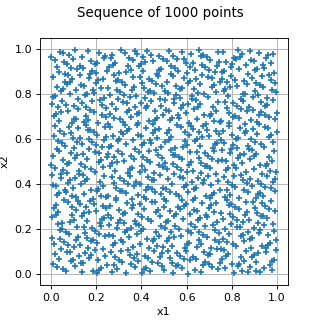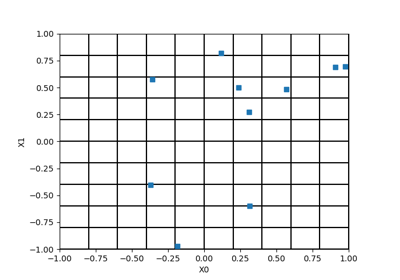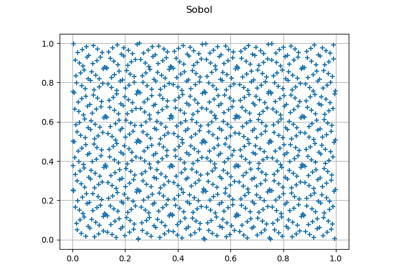HaltonSequence¶
(Source code, png)

- class HaltonSequence(*args)¶
Halton sequence.
- Parameters:
- dimensionpositive int, default = 1
Dimension of the points.
- scramblingstr
Identifier of the scrambling method. Available methods: reverse scrambling (scrambling=’REVERSE’), random scrambling (scrambling=’RANDOM’) or no scrambling (‘NONE’, default value). Default value is given by the ‘HaltonSequence-Scrambling’ key in the
ResourceMap.
Methods
ComputeStarDiscrepancy(sample)Compute the star discrepancy of a sample uniformly distributed over [0, 1).
generate(*args)Generate a sample of pseudo-random vectors of numbers uniformly distributed over [0, 1).
Accessor to the object's name.
Accessor to the dimension of the points of the low discrepancy sequence.
getName()Accessor to the object's name.
Accessor to the permutations used to scramble the sequence.
Accessor to the scrambling method.
Accessor to the linear congruential generator (LCG) used to scramble the sequences.
hasName()Test if the object is named.
initialize(dimension)Initialize the sequence.
setName(name)Accessor to the object's name.
setScrambling(scrambling)Accessor to the scrambling method.
setScramblingState(state)Accessor to the linear congruential generator (LCG) used to scramble the sequences.
Examples
>>> import openturns as ot >>> sequence = ot.HaltonSequence(2) >>> print(sequence.generate(5)) 0 : [ 0.5 0.333333 ] 1 : [ 0.25 0.666667 ] 2 : [ 0.75 0.111111 ] 3 : [ 0.125 0.444444 ] 4 : [ 0.625 0.777778 ]
- __init__(*args)¶
- static ComputeStarDiscrepancy(sample)¶
Compute the star discrepancy of a sample uniformly distributed over [0, 1).
- Parameters:
- sample2-d sequence of float
- Returns:
- starDiscrepancyfloat
Star discrepancy of a sample uniformly distributed over [0, 1).
Notes
The star discrepancy is detailed in (1) and (3).
Examples
>>> import openturns as ot >>> # Create a sequence of 3 points of 2 dimensions >>> sequence = ot.LowDiscrepancySequence(ot.SobolSequence(2)) >>> sample = sequence.generate(16) >>> print(sequence.computeStarDiscrepancy(sample)) 0.12890625 >>> sample = sequence.generate(64) >>> print(sequence.computeStarDiscrepancy(sample)) 0.0537109375
- generate(*args)¶
Generate a sample of pseudo-random vectors of numbers uniformly distributed over [0, 1).
- Parameters:
- sizeint
Number of points to be generated. Default is 1.
- Returns:
- sample
Sample Sample of pseudo-random vectors of numbers uniformly distributed over [0, 1).
- sample
Examples
>>> import openturns as ot >>> # Create a sequence of 3 points of 2 dimensions >>> sequence = ot.LowDiscrepancySequence(ot.SobolSequence(2)) >>> print(sequence.generate(3)) 0 : [ 0.5 0.5 ] 1 : [ 0.75 0.25 ] 2 : [ 0.25 0.75 ]
- getClassName()¶
Accessor to the object’s name.
- Returns:
- class_namestr
The object class name (object.__class__.__name__).
- getDimension()¶
Accessor to the dimension of the points of the low discrepancy sequence.
- Returns:
- dimensionint
Dimension of the points of the low discrepancy sequence.
- getName()¶
Accessor to the object’s name.
- Returns:
- namestr
The name of the object.
- getPermutations()¶
Accessor to the permutations used to scramble the sequence.
- Returns:
- collCollection of
Indices Collection containing the permutations used to scramble each component of the sequence. Its size is the dimension of the sequence.
- collCollection of
- getScrambling()¶
Accessor to the scrambling method.
- Returns:
- scramblingstr
Name of the scrambling method. Possible values are ‘NONE’, ‘REVERSE’ and ‘RANDOM’.
- getScramblingState()¶
Accessor to the linear congruential generator (LCG) used to scramble the sequences.
- Returns:
- stateint
The state of the LCG, defined by the recursion
.
- hasName()¶
Test if the object is named.
- Returns:
- hasNamebool
True if the name is not empty.
- initialize(dimension)¶
Initialize the sequence.
- Parameters:
- dimensionint
Dimension of the points of the low discrepancy sequence.
Examples
>>> import openturns as ot >>> # Create a sequence of 3 points of 2 dimensions >>> sequence = ot.LowDiscrepancySequence(ot.SobolSequence(2)) >>> print(sequence.generate(3)) 0 : [ 0.5 0.5 ] 1 : [ 0.75 0.25 ] 2 : [ 0.25 0.75 ] >>> print(sequence.generate(3)) 0 : [ 0.375 0.375 ] 1 : [ 0.875 0.875 ] 2 : [ 0.625 0.125 ] >>> sequence.initialize(2) >>> print(sequence.generate(3)) 0 : [ 0.5 0.5 ] 1 : [ 0.75 0.25 ] 2 : [ 0.25 0.75 ]
- setName(name)¶
Accessor to the object’s name.
- Parameters:
- namestr
The name of the object.
- setScrambling(scrambling)¶
Accessor to the scrambling method.
- Parameters:
- scramblingstr
Name of the scrambling method. Possible values are ‘NONE’, ‘REVERSE’ and ‘RANDOM’.
- setScramblingState(state)¶
Accessor to the linear congruential generator (LCG) used to scramble the sequences.
- Parameters:
- stateint
The state of the LCG, defined by the recursion
.
 OpenTURNS
OpenTURNS

